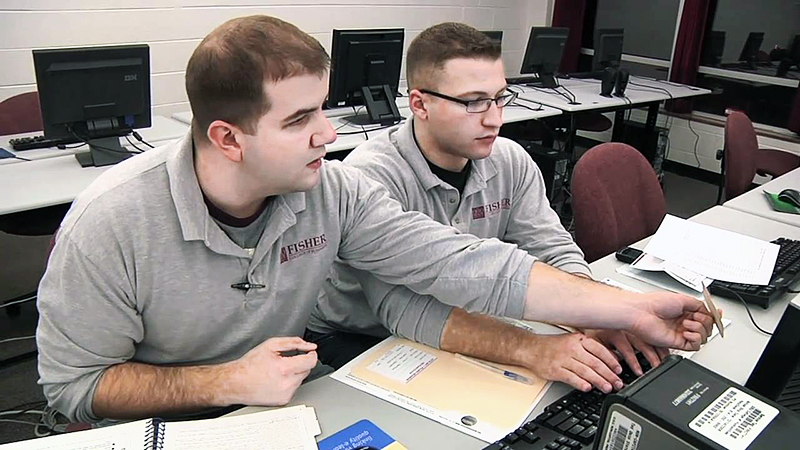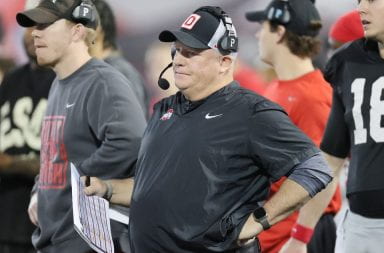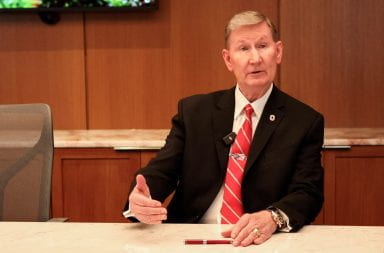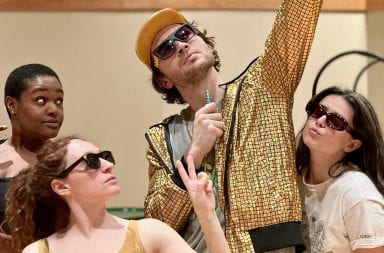
Students at the Fisher Tax Clinic work with clients to prepare their taxes and maximize their tax refund. Credit: Courtesy of OSU
Between now and April 18, millions of Americans will file their tax returns with the IRS. In fiscal year 2014, the government received more than 147 million tax returns and collected more than $1.6 trillion in federal income taxes, according to data from the IRS. The average tax refund was $2,843.
The Fisher Tax Clinic provides tax preparation services to lower- and middle-income earners in Columbus and helps clients maximize their tax refunds. The clinic, now in its 13th year, has more than 60 volunteers who are undergraduate and graduate students in accounting at the Fisher College of Business. The organization is funded by the United Way of Greater Columbus and is one of several volunteer income-tax assistance sites around Columbus, clinic director Stephanie Lewis said. The IRS Volunteer Income Tax Assistance program provides tax-preparation assistance to people earning less than $54,000 a year.
“These people are using their incomes to fund their everyday living expenses — their rent, food and clothes for their children,” Lewis said. “I would say a very high percentage of refunds are going right back into the community.”
The tax clinic is run out of Godman Guild, a community center near downtown, and clients are typically people from the nearby neighborhood. Lewis said most clients get assistance with federal and state individual tax returns, as well as filing for the earned-income tax credit.
Carrie Almasi, the director of Tax Time, the Central Ohio United Way’s network of VITA sites, said tax refunds and credits can often lead to the largest paycheck of the year for many clients. She said almost 47 percent of Ohioans use a paid tax preparer, which reduces the amount of money they receive. Lewis added that the U.S. tax code is complicated, and people often need help to ensure they are aware of all relevant tax credits and are maximizing their refund.
“It just keeps getting more complex, so it’s difficult for someone without an accounting degree or an understanding of tax to determine what forms to fill out,” Lewis said.
Lewis said most of the clinic’s clients will get a tax refund, and in any given year, the clinic generates more than $400,000 in total tax refunds. Clients schedule appointments through United Way, Lewis said, and meet with a pair of students when they come to the clinic. The students will look through the client’s tax documents and discuss information that may be relevant to each client’s tax return. The students will then file the return after it is reviewed by another team of students. Within a couple weeks, clients will receive their tax refunds. Lewis stressed the importance of the refund to the people who get their taxes prepared at VITA sites.
Almasi said the income received from a client’s tax return is often used on one-time unexpected expenses, like car repairs. She said even a few hundred dollars can provide an important financial cushion.
“The money we help clients claim can make the difference between keeping a job or a home or not, and that is a huge benefit not only to the people served but to our entire community,” she said.
Volunteers go through both ethical and technical training with the IRS, Lewis said. Additionally, students are taught how to use software. Lewis said students get an opportunity to see what they learn in their tax courses in action. Additionally, she said the clinic allows students to give back to the community and learn client-relationship skills.
“They get practice answering questions to someone who isn’t as knowledgeable as them,” Lewis said. “They get to work with people with different backgrounds and educational experiences and get a perspective of other people’s experiences.”
Nicole Williams, a graduate student in accounting, said in an email that volunteering as a site manager for the clinic allowed her to apply her tax knowledge to a client’s specific circumstances while also learning from working with other volunteers.
“VITA is a great way for us to ‘pay it forward’ not only because we’re able to provide a free service that could otherwise cost hundreds of dollars for our clients, but because we are often able to secure returns that make a substantial difference in their household budgets,” Williams said.

The Engaged Scholars logo accompanies stories that feature and examine research and teaching partnerships formed between the Ohio State University and the community (local, state, national and global) for the mutually beneficial exchange of knowledge and resources. These stories spring from a partnership with OSU’s Office of Outreach and Engagement. The Lantern retains sole editorial control over the selection, writing and editing of these stories.


